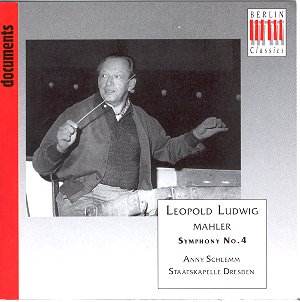Gustav MAHLER
Symphony No.4 in G major
 Anny Schlemm (Soprano)
Anny Schlemm (Soprano)
Staatskapelle Dresden/Leopold Ludwig
 BERLIN CLASSICS BC 2119-6
[50.51]
BERLIN CLASSICS BC 2119-6
[50.51]

Leopold Ludwig will be fondly remembered by Mahlerites of a certain age for
a recording of the Ninth Symphony with the London Symphony Orchestra that
achieved wide circulation in the 1960s, first through Everest and then through
the much-missed World Record Club. Coupled with Rudolf Schwarz's recording
of the Fifth Symphony on the latter label it served us very well when there
was little else available. This recording of the Fourth was made in Dresden
in 1957 and has appeared sporadically over the years, never achieving as
wide a circulation as the Ninth; not really surprising as there have always
been more recordings of this symphony to choose from.
In 1957 Mahler's music was still quite rare in the concert hall and these
Dresden players especially must have approached the work as something of
a novelty. Maybe this partly accounts for the fact that this is a very
straightforward, supremely unmannered performance compared with many other
versions - an antidote to those who take the view that every expressive
opportunity in Mahler's scores must be attended to as though under a magnifying
glass. But that can't be the only explanation. Leopold Ludwig was a fine
conductor with a high reputation and must have decided his own approach from
the start. That said I still cannot help wondering whether he felt he couldn't
really test the players as much as he may have liked in music they hardly
knew. More experienced Mahler listeners may be disappointed with the "hands-off"
approach that emerges, therefore. But there are still some dividends to be
had from this recording, especially when the orchestra concerned is one of
the greatest that, even in late 1950s East Germany, had clearly maintained
its standards through hard times.
That Mahler's Fourth could be played more idiomatically, more searchingly,
at this time is proved by a wonderful contemporary recording from Kletzki
on Royal Classics (ROY 6468) and also from a recording by Van Beinum that
predates it by a few years. However, almost contemporary with this Ludwig
recording is Reiner's on RCA Victor (09026 63533 2) and that is the one it
most resembles in spirit. Though Reiner has the better orchestra and sound
and stresses clarity to an even greater degree.
It's quite interesting today to hear a performance taking Mahler at apparent
face value in the first movement. Mahler does appear to have written something
that implies sunshine and that is certainly what you get from Ludwig. It's
almost as if he is determined to tell us there are absolutely no clouds and
no storms on this horizon. The brisk tempo he sets and keeps, one
probably closer to what Mahler intended than we may now be used to, certainly
helps. This is very much a feeling that is continued in the second movement
too. Other recordings will offer you more edge to the "Friend Death" off-key
solo violin passages, as well as greater character to the woodwind textures,
but what we have in this movement is very much in keeping with what has gone
before and what will come - plain, unadorned, uncomplicated playing. It was
only in the third movement that I felt the lack of any personal involvement
most strongly. Again the tempo is kept moving along and whilst there is still
some warmth and consolation to be felt it is only the fine phrasing of the
Dresden strings that prevents this wonderful music leaving us feeling
short-changed. The movement doesn't really linger in the mind as it really
can. Then in the last movement there is a little hesitancy in the delivery
of the bursts of reprise from the first movement that punctuates the Wunderhorn
setting. The only tangible impression of unfamiliarity with this music on
the part of the players, I feel. It's almost as if the music takes them by
surprise. Anny Schlemm is no more than an adequate soloist and certainly
doesn't manage to deliver the heart's ease that other sopranos can at the
very close. Unfamiliarity with the genre again, perhaps? Mahler's Wunderhorn
settings are a very particular mix of humour and fantasy which it has taken
a generation for singers and players to really master.
The recorded sound is spacious and clear though rather unsophisticated when
compared with modern stereo recordings. Acceptable if you feel like giving
this early recording of the Fourth a try. In my synoptic survey of this work
I recommend recordings by Kubelik (DG), Horenstein (Chief), Kletzki (Royal),
Britten (BBC Legends) and Szell (Sony) and see no reason to change that
conclusion at the moment.
An interesting recording of Mahler's most popular symphony from an era prior
to the Mahler boom and from behind the Iron Curtain.
Tony Duggan
ORDERING AND ENQUIRIES:-
www.edelclassics.com
EDEL/Berlin Classics discs CANNOT yet be ordered directly from
the website. However it is probably worth browsing anyway:
You can try:-
EDEL affiliates in UK and USA:
edel UK ltd.
12, Oval Road
NW1 7DH London
phone: 0044 207 48 24 848
fax: 0044 207 48 24 846
edel America Records, Inc.
1790 Broadway, 7th Floor
New York, NY 10019
phone: 001 212 5419700
fax: 001 212 6648391

